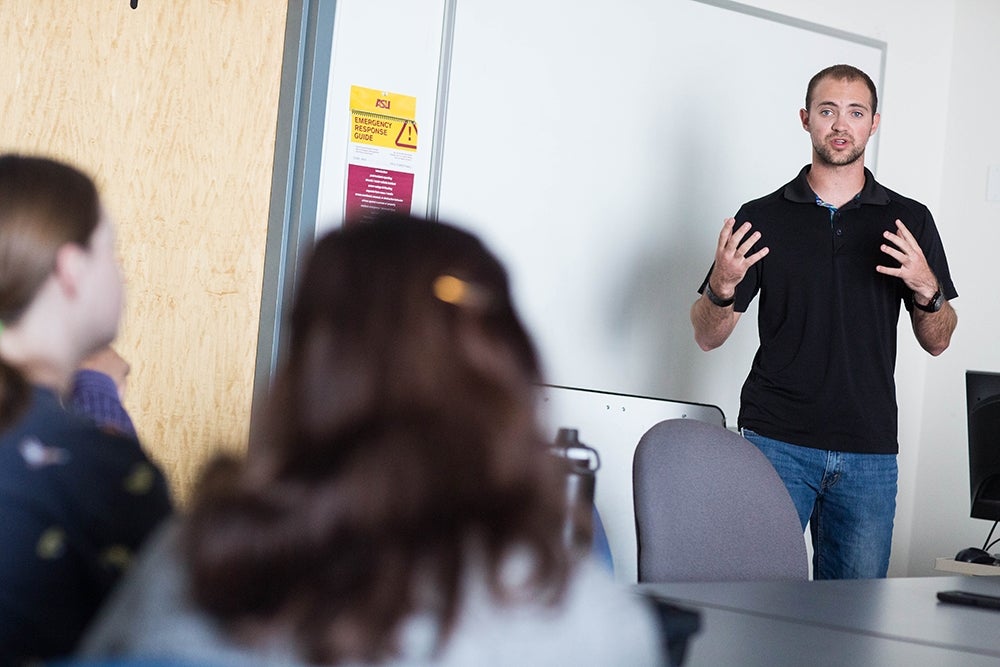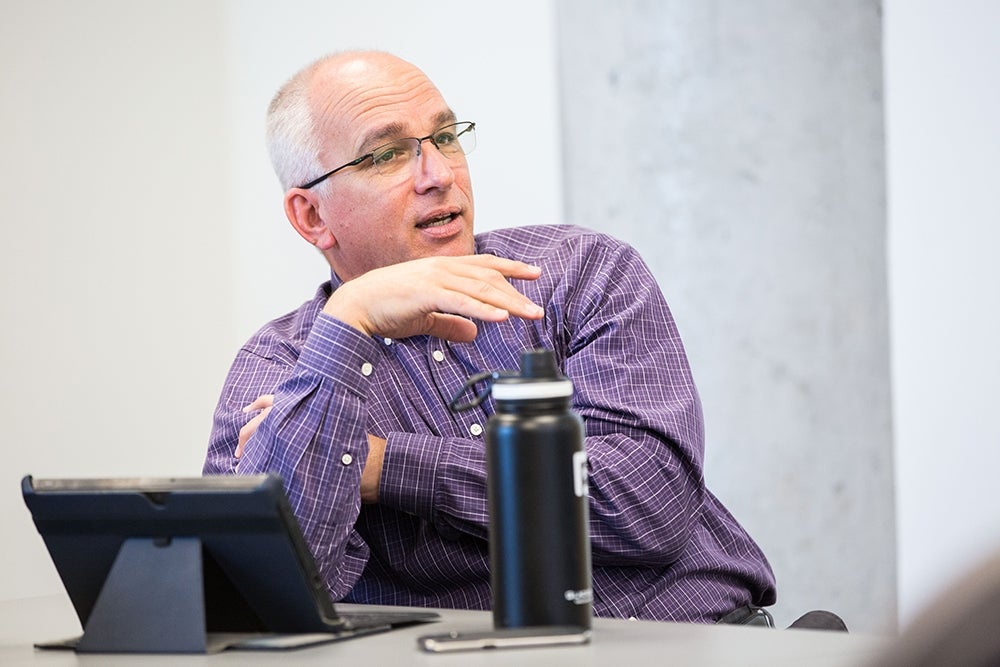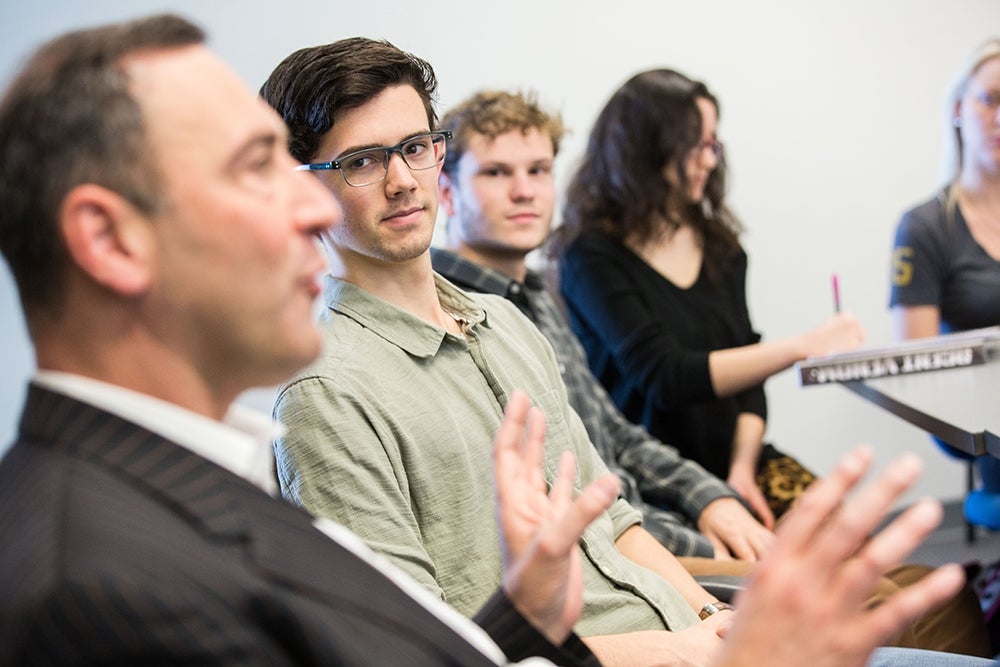Since its inception, ASU’s Center on the Future of War has led discussions on the emerging role of drones and autonomous weapons, the civilian impact of the conflict in Syria, and the significance of “lone wolf” terrorist attacks in post-9/11 America.
Now in its first year under a new White House administration, the center is shifting its focus to the rise of ISIS, the future of Middle East conflict and possible reconciliation, and the National Security Agency.
Center on the Future of War leaders say these challenges should be at the forefront of everyone’s thinking as the nation enters into a new era of international relations — and potential conflicts.
“There is a broad-based interest in discussing conflict and war within our society,” said ASU professor of practice Daniel Rothenberg, who co-directs the center with CNN senior analyst and ASU faculty member Peter Bergen. “Our students are part of a post-9/11 war generation, having grown up their entire lives with our country involved in ‘the longest war,’ and current political discourse is dominated by accounts of violence and multiple global threats.”
Since its formation in 2014, the center has brought together a team of ASU faculty and policy experts to explore the social, political, economic and cultural implications of the changing nature of war and conflict, addressing these issues by linking more than 100 affiliated faculty at Arizona State University with a team of three dozen national security experts at New America, an interdisciplinary Washington, D.C.-based think tank and civic engagement institutionThe Center on the Future of War operates under the dean of the College of Liberal Arts and Sciences with support from the School of Politics and Global Studies., according to organizers.
These thinkers, writers and decision-makers seek to attract media coverage and create meaningful public engagement.
“There is such a babble of voices in Washington and everybody has a platform, so it all becomes noise after a while,” said Pulitzer Prize-winning reporter and New America Fellow David Wood. He said the center presents thoughts and ideas from a calm, sober and well-informed place.
Wood added the partnership between ASU and New America allows the center to “have one foot in Washington and one in the real world.”
One of the center’s signature events is the annual Future of War Conference held in Washington, which features senior military leaders from each branch, scholars and a number of less traditional voices. That is no small feat, said Benjamin C. Freakley, former commanding general for the U.S. Army.
“It’s remarkable and has created exceptional networks for awareness on this critical topic,” said Freakley, who is also a special adviser to ASU President Michael Crow for leadership initiatives. He said the conference serves as a superb platform in Washington for leaders to get their message out in front of a “broad, sophisticated and involved audience.”
Last year’s event drew more than 400 people, and more than 11,000 viewed it via live stream — a 60 percent increase from the 2015 conference. Tweets about the 2016 conference reached more than 2 million with #FutureofWar the third-highest trending hashtag in Washington, D.C. during the event.
This year’s conference will be on March 21 and features Gen. Mark Milley, chief of staff of the U.S. Army, and Gen. David Goldfein, chief of staff of the Air Force, speaking about the future of their services; Eric Schmidt, former CEO of Google, discussing links between Silicon Valley and national security; Juan Carlos Pinzon, the Colombian ambassador to the U.S., speaking about the end of decades of civil war; and academics from ASU and elsewhere speaking about social media, moral injury and the possibilities of peace in a turbulent world.
From past and current discussions, center experts have determined that the future of war will be defined by innovations in labs, cyberspace and technological and scientific advantages — as well as broad shifts in global culture, demographics, climate change and competition over resources.
The talk isn’t confined to Washington. The center hosts an annual spring speakers’ series and facilitates classroom visits and guest lectures, giving students and community members an opportunity to participate.
“We try and select people who are interesting thought leaders who are involved with exciting and innovative work,” Rothenberg said. “We want to launch big, interdisciplinary ideas in a number of different spaces at the time, which includes Arizona.”
Wood, who kicked off the spring 2017 lecture series to introduce the term and his book “Moral Injury” to the public lexicon, said his January visit to ASU was memorable.
“I was quite taken by the students and the questions they asked me,” Wood said. “Those kids were not afraid to challenge me, and it brought a whole new perspective I would have never gotten had I not visited Arizona.”
The center also creates a platform for policy-oriented scholarly research for ASU Future of War Fellows at New America, tapping the talents of ASU students to assist with papers, books and articles. Current projects include an investigation of reconciliation in Iraq based on in-depth fieldwork in multiple communities formerly controlled by ISIS, the impact of gender issues on national security and conflict, a comparative review of domestic genocide laws and emerging military technologies.
Their work also extends to universities around the world, including a project on moral injury linked to the PLuS Alliance connecting ASU, the University of New South Wales and Kings College London.
Student Ryan Schneidewind assisted political scientist, author and New America senior strategist P.W. Singer on his new book, “Cyber Security and Cyber War: What Everyone Needs to Know.”
“The research is interesting because it’s so much bigger than just ASU,” said Schneidewind, a 2016 political science graduate who is seeking his master’s at Georgetown University. “I gained an understanding of what academia was besides just sitting in class.”
Alexa Magee, who conducted research for Rothenberg and Bergen’s book “Drone Wars,” worked at the International Criminal Tribunal for the former Yugoslavia after graduating and is currently a program assistant for the American Red Cross field office in Yangon, Myanmar. She said that she was able to pursue a career in international law as a direct result of her work and research at the center.
“Working with the center helped me hone the research skills needed to write project proposals and gave me a forward-thinking perspective,” Magee said. She added it’s a needed skill when implementing projects that “prepare communities for distressing events and mediate harmful consequences.”
Erin Schulte, a 21-year-old global studies major and Marshall Scholar, said the center not only produces important work, but is minting leaders.
“These are some of the brightest students I have ever had the privilege to know,” Schulte said. “You can tell these are going to be the future leaders in their fields.”
Top photo: Afghanistan. Photo by FreeImages.com
More Law, journalism and politics

ASU Law to honor Africa’s first elected female head of state with 2025 O’Connor Justice Prize
Nobel Peace Prize laureate Ellen Johnson Sirleaf, the first democratically elected female head of state in Africa, has been named the 10th recipient of the O’Connor Justice Prize.The award,…

Native Vote works to ensure the right to vote for Arizona's Native Americans
The Navajo Nation is in a remote area of northeastern Arizona, far away from the hustle of urban life. The 27,400-acre reservation is home to the Canyon de Chelly National Monument and…

New report documents Latinos’ critical roles in AI
According to a new report that traces the important role Latinos are playing in the growth of artificial intelligence technology across the country, Latinos are early adopters of AI.The 2024 Latino…



